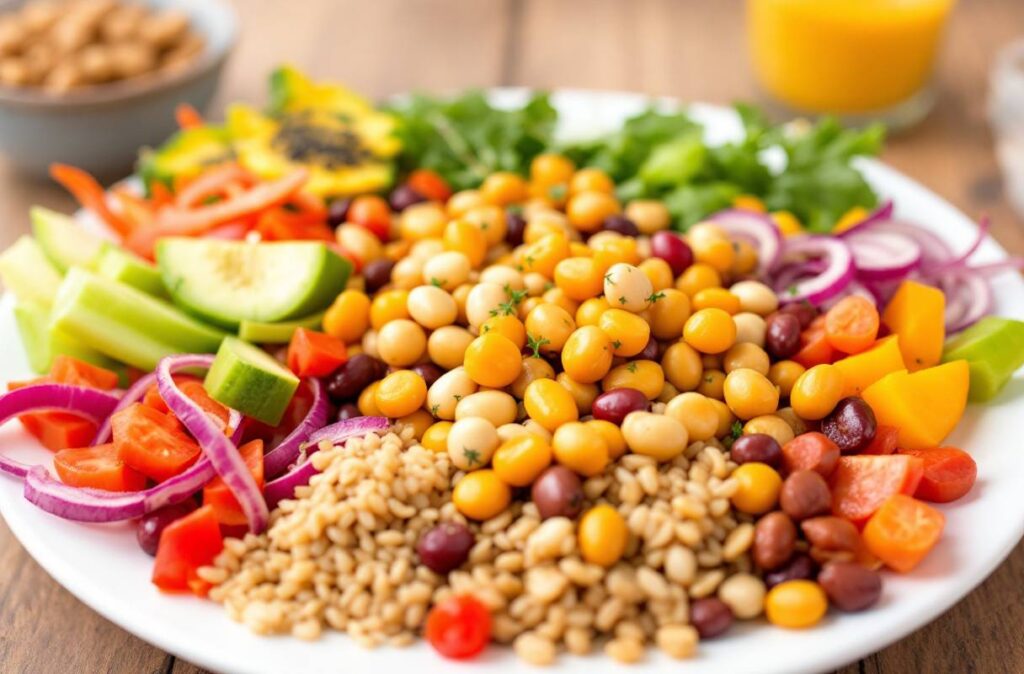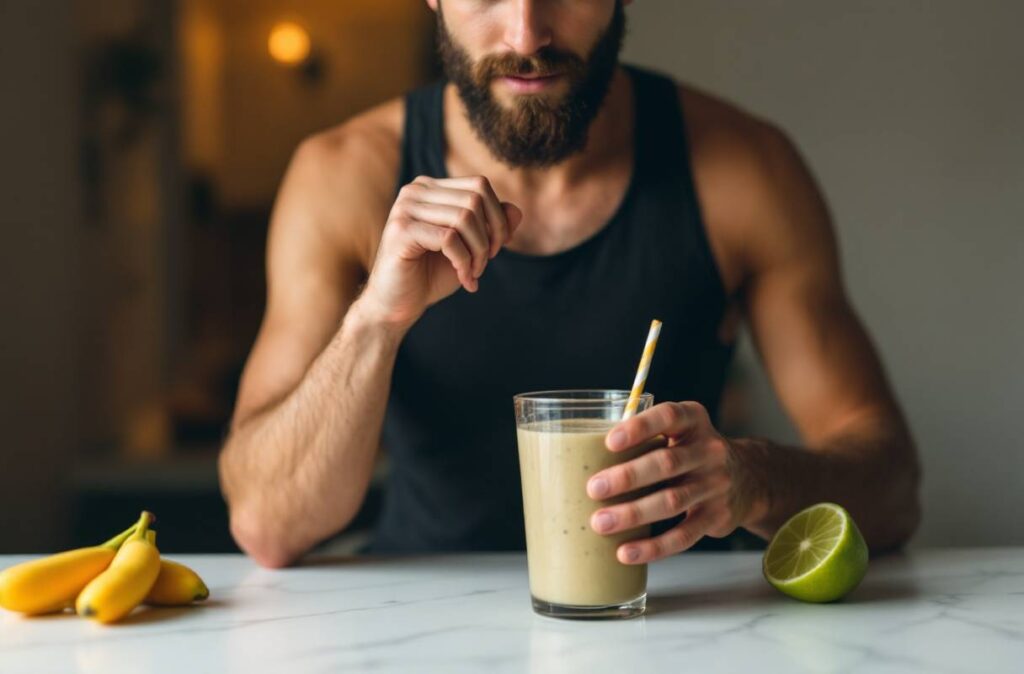Imagine waking up every morning feeling energized, knowing that your meals not only boost your health but also contribute to a healthier planet.
Embracing a plant-based diet is more than just a trend—it’s a transformative lifestyle choice that can revolutionize the way you eat, feel, and live.
Whether you’re aiming to shed a few pounds, enhance your athletic performance, or reduce your environmental footprint, this ultimate guide will walk you through everything you need to know to start your plant-powered journey with confidence and ease.
Benefits of Plant-Based Diets
There’s a lot to love about tucking into a plant-based diet. It’s not just about munching on greens; it’s about embracing a lifestyle that can supercharge your health, give Mother Earth a break, and might even make you feel like a marathon champ without the coach yelling in your ear.
Health Advantages

Folks who plant their fork in the veggie patch are often the ones skipping past the chronic illness line. Swap the steak for some scrumptious seeds, whole grains, nuts, and veggies, and your heart will give you a thumbs-up. Harvard Health Publishing says it’s cool – you’ll dodge problems like coronary heart disease, high blood pressure, and Type 2 diabetes.
There’s plenty more greens where that came from. These diets are packed with fiber and those snazzy phytonutrients your body craves. Just remember, if you’re going full vegan, you might need a little Vitamin B-12 pick-me-up.
| Health Boost | Recommended Diet |
|---|---|
| Sayonara, heart disease! | Vegetarian (Harvard Health Publishing) |
| Bye-bye, Type 2 diabetes! | Plant-Based (Forks Over Knives) |
| Hello, happy heart! | Whole-Food, Plant-Based (Forks Over Knives) |
Wanna jump on the kale train? Check out our guide on plant based diet for beginners.
Environmental Impact
Going plant-based ain’t just about feeling good; it’s about doing good for our planet too. Farming animals eats up loads of resources and doesn’t do the environment any favors – hello, deforestation and greenhouse gases! Making a swap to plants means giving the planet a well-deserved breather.
| Eco Perks | What It Does |
|---|---|
| Smarter resource use | Uses less water and land |
| Reduced emissions | Fewer greenhouse gases (Forks Over Knives) |
Dig into this green scene in our article on cheap plant based diet.
Performance Enhancement

If you’re chasing after more than just your dog, a plant-based munch-fest might just rev up your engine. Fitness lovers, listen up: these foods can power up your stamina and mood. Studies backed by Forks Over Knives tell us plant devotees get more health kicks than those still grazing over steak.
Got a game to win? Load up on best plant based protein and plant based omega 3 sources to keep the energy flowing. You might notice:
- Quicker bounce-back after workouts
- Rocket-like energy bursts
- A boost in heart health
For more play-by-play advice and grub plans, check out our plant-based athlete diet.
Setting sail on a plant-based diet brings a bounty of perks – for your health, our planet, and perhaps that inner warrior athlete in you. It’s a lifestyle change that feels good and does good.
Essential Nutrients in Plant-Based Diets
Between saving the planet and being kind to animals, switching to a plant-based diet’s got its perks, no doubt. But to truly ride the green wave, you gotta know where your nutrients are coming from—think proteins, iron, vitamin B-12, and those ever-so-healthy Omega-3 fatty acids.
Protein Sources
Worried about where you’re getting your protein? Don’t be. The plant kingdom’s got your back. Picture this: legumes, nuts, seeds, soy products, whole grains, and veggies like spinach—all protein champs! (Down to Earth). Not only do they pack a protein punch, but they also come with a side of essential nutrients.
| Food Type | Protein Hero | Protein (g/100g) |
|---|---|---|
| Legumes | Lentils | 9 |
| Nuts | Almonds | 21 |
| Seeds | Chia Seeds | 17 |
| Soy Products | Tofu | 8 |
| Whole Grains | Quinoa | 4 |
| Veggies | Spinach | 3 |
Yearning for more protein ideas? Check out best plant based protein.
Iron Absorption Optimization
Iron—necessary for survival, a bit tricky in plants. While our bodies prefer the iron from meat (heme iron), you can still play it smart with plant iron (non-heme iron). Think of pairing up iron-loaded foods with some vitamin C buddies like bell peppers, citrus goodies, and broccoli.
| Iron Buddy | Vitamin C Sidekick |
|---|---|
| Lentils | Bell Peppers |
| Spinach | Citrus Fruits |
| Chickpeas | Broccoli |
Craving that iron boost? Steer clear of coffee, tea, and calcium when you have iron-rich meals, as they like to play party poopers for iron absorption. Hungry for more tips? Peek at plant based iron sources.
Vitamin B-12 and Omega-3 Fatty Acids
Vitamin B-12’s the nerve whisperer and blood’s best friend, but it likes hiding from vegans—time to get creative! Fortified favorites like nutritional yeast, cereals, mock meats, and non-dairy drinks, or straight-up supplements after a chat with your doctor, are the go-to moves (Down to Earth).
| Fortified Snack | B-12 Goodness (mcg/100g) |
|---|---|
| Nutritional Yeast | 17.6 |
| Fortified Cereals | 4 |
| Meat Alternatives | 2 |
| Non-Dairy Milk | 1 |
Omega-3s, the body’s best friend you can’t make on your own. Look no further than your plant buddies like seeds (chia, flax, hemp), walnuts, and some oils. For more dish on this, see plant based omega 3 sources.
| Omega Source | ALA (g/100g) |
|---|---|
| Chia Seeds | 17.8 |
| Flaxseeds | 22.8 |
| Walnuts | 9.1 |
| Hempseeds | 8.1 |
If you’re kicking off your plant-based adventures and need to keep all your nutrient ducks in a row, check out plant based diet supplements needed and plant based meal prep for some friendly advice.
Starting a Plant-Based Diet
Planning Your Transition
Making the switch to a plant-based diet is like booking a ticket to better health and sustainability. It’s a trip you can’t rush into, so first up, have a game plan. Start slowly by sneaking more plant-based meals into your weekly lineup. It’s a bit like getting into a cold pool — easy does it.
- Set Clear Goals: Why are you doing this? Better health? Mother Earth? Running faster than your next-door neighbor? Figure out what drives you.
- Educate Yourself: Get a grip on plant-based nutrition. Dive into our plant based diet for beginners.
- Create a Meal Plan: Think ahead to stay on track without falling into the fast-food trap. Planning apps or guides like plant based meal prep can be your best friends.
Incorporating Whole Foods
This diet is all about munching on whole, unprocessed foods. Think of these as the Avengers of Plant Eating: fruits, veggies, legumes, whole grains, nuts, and seeds. They pack a punch with nutrients and can keep your body running like a well-oiled machine.
| Food Group | Examples | Nutrients |
|---|---|---|
| Fruits | Apples, Berries, Citrus | Vitamins, Fiber, Antioxidants |
| Vegetables | Leafy Greens, Carrots, Broccoli | Vitamins, Fiber, Minerals |
| Legumes | Lentils, Chickpeas, Black Beans | Protein, Fiber, Iron |
| Whole Grains | Quinoa, Brown Rice, Oats | Carbs, Fiber, B Vitamins |
| Nuts and Seeds | Almonds, Chia Seeds, Flaxseeds | Healthy Fats, Protein, Omega-3 |
Need more inspiration? Look into our plant based diet weight loss guide.
Budget-Friendly Options
Going plant-based doesn’t have to break the bank. In fact, shifting to this lifestyle can keep a few more bucks in your pocket. Some studies have shown vegans might save a whopping $750 a year compared to meat-lovers! Thanks, Parkview Health and Forks Over Knives.
- Buy in Bulk: Stock up on big bags of beans, lentils, rice, and oats to keep your wallet happy.
- Seasonal Produce: Buy what’s in season. It’s cheaper and tastes better. Simple economics, really.
- Cook at Home: Dining out may cost an arm and a leg. Home-cooked meals? Way easier on the budget. Check out cheap plant based diet for penny-pinching tips.
Adding more affordable, nutrient-rich foods can ease your shift to a plant-based lifestyle without the hassle. Remember, if you’ve got health concerns or special dietary needs, don’t skip out on talking to the pros.
Adapting Plant-Based Choices
Thinking about taking the plunge into a plant-based diet? Relax! It’s less complicated than it sounds. With some straightforward shifts and a dash of creativity, you’ll find it to be a satisfying adventure. Here’s a few down-to-earth tips to get you rolling smoothly.
Nutrient Swaps That Work
Protein: Don’t fret about your protein intake. Options like beans, nuts, seeds, soy goodies, and whole grains are your new best friends. Even veggies like spinach and peas pack a protein punch. Veggie lovers usually hit their protein marks and often go beyond.
Iron: Max out your iron by matching it with vitamin C-rich foods. Got a thing for coffee or tea? Keep them away from meals as they might play defense against iron absorption. Same goes for calcium supplements.
Vitamin B-12 and Vitamin D: You might need a little boost with supplements for these. No worries though, tricked-out foods and fortified stuff come to the rescue (Johns Hopkins Medicine).
| Nutrient | Plant-Based Picks |
|---|---|
| Protein | Lentils, Chickpeas, Quinoa, Tofu |
| Iron | Lentils, Chickpeas, Spinach |
| Vitamin B-12 | Fortified cereals, Nutritional yeast |
| Vitamin D | Fortified plant milk, Sunlight |
Check out more about plant proteins in our best plant-based protein guide.
Savvy Meal Planning
Meal prep is your new secret weapon for hassle-free plant-based eating. Here’s a few tricks to streamline your days:
- Batch Cooking: Whip up big batches of grains, beans, and roasted veggies. Super handy to grab from the fridge or freezer when life’s in the fast lane.
- Mason Jar Salads: Pack a jar with layers of goodness for grab-n-go salads.
- Smoothie Packs: Bag up your smoothie fixings for a zippy morning kickstart.
For step-by-step meal prepping magic, dance over to plant-based meal prep.
| Strategy | What to Do |
|---|---|
| Batch Cooking | Large batches of grains, beans, veggies |
| Mason Jar Salads | Pack layers for easy meals |
| Smoothie Packs | Freeze-ready smoothie ingredients |
Recipe Remixing
Jazz up your meals by switching to plant-friendly ingredients. Your taste buds won’t even miss the old stuff:
- Dairy: Almond, soy, oat, or rice milk stand ready to swap cow’s milk.
- Meat: Tofu, tempeh, seitan, or trusty beans step in beautifully for meat.
- Eggs: Flaxseeds or chia seeds (mix 1 tablespoon of ground with 3 tablespoons of water) replace eggs seamlessly.
| Old Favorite | Plant-Based Star |
|---|---|
| Cow’s Milk | Almond Milk, Soy Milk |
| Meat | Tofu, Tempeh, Seitan |
| Eggs | Flaxseeds, Chia Seeds |
Want more swap ideas? Hop over to our plant-based snack ideas guide for more tasty twists.
Embracing plant-based eating comes with plenty of upsides. By mixing up your nutrients, planning like a pro, and getting snazzy with ingredient swaps, you’ll be cruising through this lifestyle with ease. Curious about a budget-friendly approach? Don’t miss our take on a cheap plant-based diet and how it can boost plant-based diet weight loss.
Tweaking Plant-Based Eats
Flexitarian Adventures
A flexitarian diet is a chill way of leaning into plant-based eating, with room for a burger now and then. Mostly, it’s about munching on veggies, fruits, nuts, seeds, oils, whole grains, and all those legumes and beans that make your grandma proud (Harvard Health Publishing). This setup is perfect for folks who want the greens without completely ghosting meat or dairy.
Flexitarian Diet Highlights
- Mostly Plants: Load up on those greens
- Sometimes Meaty: A little meat, dairy, fish when the craving hits
- Perks: Lower odds of heart problems, better cholesterol vibes
Curious about jumping into plant-based eats? Check out our guide plant-based diet for beginners.
Customizing Your Nutrition
Customizing your nutrition is like getting the perfect pizza – everyone likes it different. On a plant-based diet, you wanna keep an eye on crucial stuff like protein and iron.
| Nutrient | Plant-Based Sources | Internal Links |
|---|---|---|
| Protein | Legumes, nuts, seeds, tofu | best plant based protein |
| Iron | Spinach, lentils, chickpeas | plant based iron sources |
| Calcium | Almond milk, kale, chia seeds | plant based calcium foods |
| Vitamin B-12 | Fortified cereals, nutritional yeast | plant based diet supplements needed |
| Omega-3 | Flaxseeds, walnuts, chia seeds | plant based omega 3 sources |
Dive deeper with our piece on best plant-based supplements to nail your nutritional hit list.
Teaming Up with the Pros
When in doubt, call a nutritionist or dietitian. They’re like your diet fairy godparents, ready to whip your eating plan into shape (Johns Hopkins Medicine).
Why Chat with a Pro?
- Customized Plans: Fit your personal health dreams and taste buds
- Nutrient Tips: Keep it balanced with the right stuff
- Support System: Regular check-ins, major motivation
Dig through our plant-based athlete diet and other gems for great diet plans and expert advice.
Fine-tuning a plant-based diet to fit personal quirks can make sticking to it a breeze. Focus on nutrient-packed dishes, and don’t hesitate to ask for professional help, to make your plant-based experience the best yet.
Conclusion
Embarking on a plant-based diet is a rewarding journey that offers profound benefits for your health, the environment, and your overall well-being.
By understanding the essential nutrients, planning your meals thoughtfully, and embracing budget-friendly and flexible approaches, you can seamlessly integrate plant-based living into your daily routine.
Whether you’re motivated by health goals, environmental concerns, or athletic performance, this guide equips you with the knowledge and tools to thrive.
Remember, every plant-based meal is a step towards a healthier you and a more sustainable planet. Start nourishing your life today and experience the transformative power of plant-based eating!
Resources
FAQs
1. What are the main health benefits of a plant-based diet?
A plant-based diet can lower the risk of chronic diseases such as heart disease, high blood pressure, Type 2 diabetes, and certain cancers. It also provides essential nutrients like fiber, vitamins, and phytonutrients that promote overall health.
2. How can I ensure I’m getting enough protein on a plant-based diet?
You can obtain sufficient protein from legumes, nuts, seeds, soy products, whole grains, and vegetables like spinach. Incorporating a variety of these protein-rich foods ensures you meet your daily protein needs.
3. What should I do to optimize iron absorption from plant-based sources?
Pair iron-rich plant foods with Vitamin C-rich foods like bell peppers, citrus fruits, and broccoli. Avoid consuming coffee, tea, or calcium-rich foods alongside iron-rich meals to enhance absorption.
4. Do I need to take supplements on a plant-based diet?
While it’s possible to get most nutrients from a well-planned plant-based diet, supplements for Vitamin B-12 and Vitamin D may be necessary. Consult with a healthcare professional to determine your specific needs.
5. Is a plant-based diet more expensive than a traditional diet?
Not necessarily. Plant-based diets can be cost-effective by buying in bulk, choosing seasonal produce, and cooking at home. In some cases, it may even save you money compared to a meat-heavy diet.














